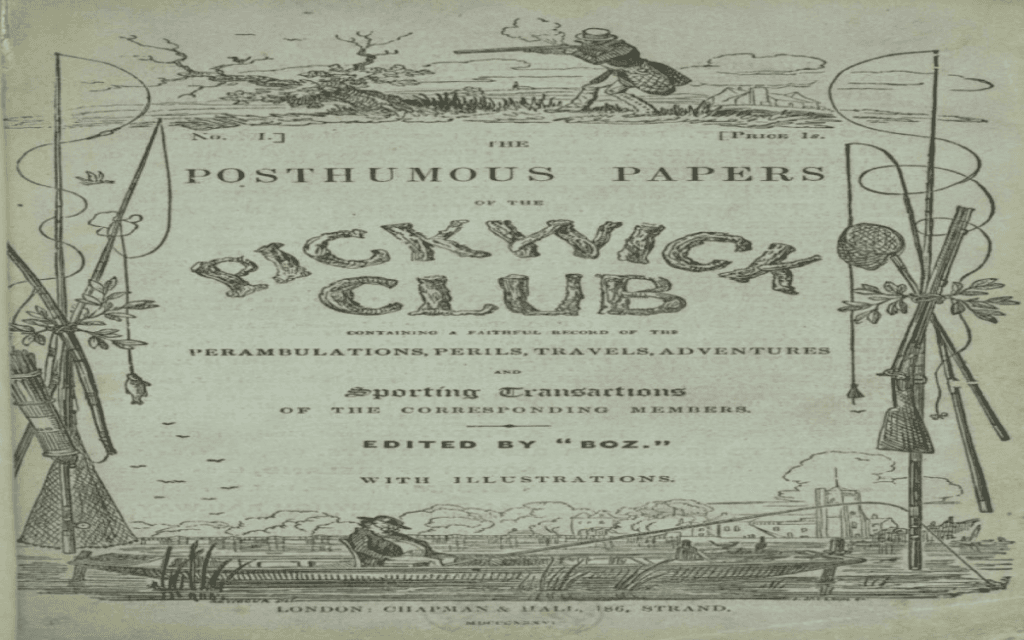The Pickwick Papers by Charles Dickens is arguably one of the best comic novels of all times. Though written in the often flowery and intricately descriptive style of Charles Dickens, The Pickwick Papers is a heartily humorous narrative about the society of those times. And as must be obvious by now, The Pickwick Papers is what shall be reviewing today. Please read on for this blog’s first book review.
About the Author:
Charles Dickens was born on 7th February, 1812 at Portsea, near Portsmouth, where his father was a clerk in the Navy Pay office. On promotion, his father moved to Chatham, when Dickens was three years old. As a boy he was able to visit the theatre, to buy books and began to have dreams of acquiring education.
But things changed as his father got hopelessly into depth and was arrested in February 1824. Charles had to work in Warren’s Blacking factory owned by a relative. He had to work in the dirty, rat-infested old house, sticking labels on blacking bottles. This was the first raw impact of life on a sensitive boy who had lived in a world of dreams. Such experiences became the subject of his novels and have been immortalized in his fiction.
Charles became a reporter in the Press Gallery of the House of Commons due to his great speed and accuracy in shorthand. This set the stage for fiction writing. His first book Sketches by Boz appeared in 1936 followed by The Pickwick Papers. The Pickwick Papers made Dickens instantaneously famous due to its character Sam Weller. Dickens soon became the conscience of the country. Dickens’ death was sudden and dramatic due to a stroke. He was buried with pomp at Westminster’s Abbey, an honor which he fully deserved.
The Pickwick Papers:
Hi guys. I’ve actually read the complete, unabridged version of the book, and it’s looong. Its literally 926 pages long. When I first told my grandma about it, she remembered reading it as a kind and said it was hilarious. When I read it, it was quite funny at times, but very lengthy.
The story is based on this guy called Mr. Samuel Pickwick, the founder and chairman of the Pickwick Club. He, along with a couple of his friends, wish to expand their store of knowledge and experiences, and therefore the suggests that three other “Pickwickians” should make journey to places remote from London and report on their findings to the other members of the club about the quaint and curious phenomena of life. The novel was originally meant for publication as a serial. It showcases the journeys and the experiences of these people.
Their travel throughout the English countryside provides the chief theme of the novel with generally accurate description of the old coaching inns of England. The entry of Samuel Weller, the most popular character of the novel, makes the story even more interesting. Some notable adventures include Mr. Pickwick’s attempts to defend a lawsuit brought by his landlady Mrs. Bardell who is suing him for breach of promise. Another is Mr. Pickwick’s incarceration at Fleet prison. Across the story you find a generally humorous tone, sometimes replaced by biting social satire.
If you consider taking up this book, look for an abridged version, and I guarantee you will like it. The reason I am not recommending the complete one is because it is too long and filled to the brim with heavy description that sometimes overshadows the genuine humor throughout the tale. Plus, by the time you finish reading another hundred pages, you forget what had happened before. It makes it very difficult for the reader to connect the entire story. Plus, nowadays it is very difficult to even find an unabridged version in the stores. I have bought mine from a second-hand book store. Anyways, The Pickwick Papers is one of those novels that you can never forget.
Outro:
So that was it for today. I hope you liked the review. If you did, please consider subscribing to the blog here. Stay tuned for more updates. Until next time, au revoir!

